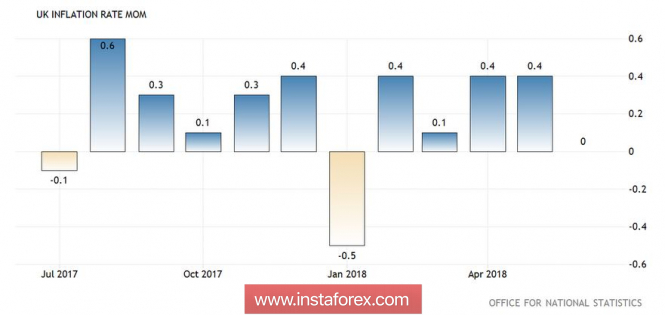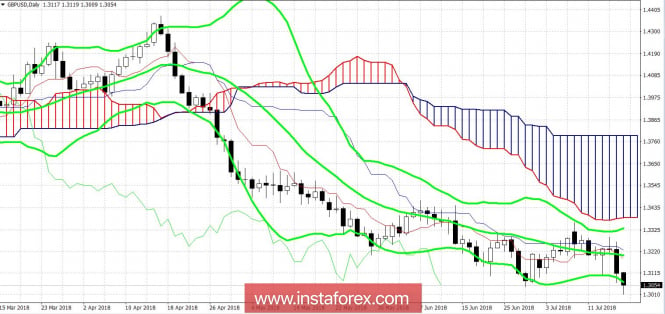The British currency is again under considerable pressure - both from macroeconomic indicators and the rhetoric of the head of the English regulator, and from the political prospects of Brexit. Relatively recently, the pound has experienced such a negative combination: in the spring of this year, the key indicators of the economy have significantly decreased, and the probability of a "hard" divorce between London and Brussels has increased significantly. A similar situation is happening now, however, with certain nuances.
The "black band" of negative events for the pound began as early as the beginning of the week, when Theresa May began her next confrontation with the parliament about the further relations between London and Brussels. At stake was an amendment to the Brexit law governing trade relations after the country's withdrawal from the Alliance – if this amendment were adopted, Britain would have had to stay in the customs union. This factor would have a negative impact on the pound, as Theresa May voiced her firm intention to leave the single market, creating a free trade zone with more expanded "functionality" (in particular, the ability to enter into trade transactions with third countries).
If May had not defended that intention, the prime minister's chair would reel under her again, while her resignation in the current circumstances is comparable to a political disaster. In the course, even direct threats of a political nature were used: before the vote, Theresa May's supporters told their colleagues that they were ready to announce a no-confidence motion to the premier and hold early elections to parliament if the deputies did not support its foreign policy course. But even with such rhetoric, the preponderance of votes in favor of rejecting the amendment was minimal - 307 against 301.
The odious amendment was not adopted, after which the law was voted in the third reading and sent to the House of Lords for approval. The GBP/USD pair, in turn, jumped by almost a hundred points. However, the price correction was short-term. The minimal number of superiority in parliament suggests that Theresa May, against the background of recent events and high-profile resignations, has lost the support of many deputies. If The House of Lords returns the law to the lower house for review, the risk of political failure for the prime minister is high.
In addition, the situational victory of Theresa May in the parliament does not mean anything. Now it needs to defend the main positions of the updated "White Paper" in Brussels. It will not be easy – too many privileges and preferences trying to keep London after parting with the Alliance. For example, last year the Europeans were categorically opposed to the fact that Britain enjoyed the advantages of the single market and would have the opportunity to independently enter into trade transactions with third countries. The rest of the situation is similar: it seems that Theresa May goes from the maximum, leaving room for maneuver in the search for a compromise solution.
One way or another, fears about the "hard" Brexit returned to the market. Mark Carney also added fuel to the fire, who warned about the apocalyptic consequences of such a scenario at the parliamentary hearings on Tuesday. In particular, the head of the Bank of England said that if Britain withdraws from the EU without a deal, then the country will be guided by the terms of the World Trade Organization. This will put Britain" in the worst economic situation " with all the ensuing consequences.
The weak pound finally lost its foothold, especially when Carney linked Brexit with the prospects for monetary policy. He stressed that in this case, the central bank will not only review its policy, but also call into question the work of many financial institutions of the country." In other words, Carney allowed for the possibility of interest rate cuts in the case of "hard" Brexit or (at least) a long-term pause in the issue of tightening the conditions of monetary policy. Mark Carney has not held such a "dovish" and categorical position. And this is against the background of general market expectations regarding the rate increase at the August meeting of the Bank of England. This contrast of sentiment increased the pressure on the pound.

As a "control shot," British inflation data was published, which came out in the red zone on Wednesday. The consumer price index in monthly terms slowed down to zero level, and in annual terms remained at the same level of 2.4%, with growth forecast to 2.6%. The core inflation index also fell short of the forecast values (1.9%, with the forecast of 2.1%). The retail price index, the purchasing price index, the producer price index – all these inflation indicators were worse than expected, showing a slowdown.
A set of negative fundamental factors continues to put pressure on the pound. The GBP/USD pair reached the bottom of the 30th figures – the last time the price was at such low prices was in the autumn of last year. Now everything will depend on the results of the next negotiations between Britain and the EU, taking into account the main positions of the "White Paper".

If Brussels shows willingness to compromise, the pound will quickly recover to at least the first resistance level of 1.3190 (the average line of Bollinger Bands, coinciding with the Tenkan-sen line). But if the negotiation process again comes to a standstill and the "hard" Brexit looms again on the horizon, the pair will not only return to the annual low, but will also go to the 29th figure with the main downward target of 1.2910. After all, the "hard" scenario of Brexit includes the likelihood of easing monetary policy, by analogy with 2016.
The material has been provided by InstaForex Company - www.instaforex.com